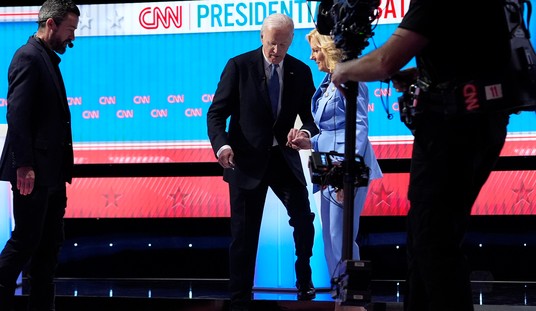Mission accomplished? This week’s address to a joint session of Congress offered Donald Trump a chance to reset the public narrative after a first month filled with policy wins and process problems. Rather than tackle the first major presidential speech after Inauguration Day as a campaign speech, Trump stuck to the conventions of State of the Union speeches and projected a presidential mien. According to Gallup, that effort paid off with a renewed sense of confidence for more than a third of the electorate:
President Donald Trump’s address to Congress on Tuesday night had a positive effect on many of those who watched it or read news coverage about it later. Almost six in 10 of this group rated the address as excellent or good, and more than one in three said it made them more confident in Trump’s abilities to carry out his duties as president.
Gallup does note, though, that this effect may have been strongest among Republicans, who were much more likely to watch the speech live:
Looked at differently, 85% of Republicans and Republican-leaning independents said they either watched live or read news reports about the speech, contrasted with 68% of Democrats and Democratic leaners.
Therefore, the positive reactions to Trump’s address among speech watchers partly indicate Trump was successful in reaching out to and reinforcing his base. Trump’s efforts to shift Democrats’ views in a more positive direction, on the other hand, do not appear to have been successful. A scant 5% of Democrats said they became more confident in Trump’s abilities as president after the speech, with 15% saying they are less confident and 80% saying it made no difference. By contrast, six in 10 Republicans said the speech made them more confident.
The Democratic reaction did not follow the top line, however. Overall, 36% of respondents said that the speech boosted their confidence in Trump, while only 11% said it made them less confident. Gallup doesn’t include the reaction of unaffiliated voters in their analysis, which would have been helpful, but it doesn’t appear that they followed the Democratic respondent model based on the overall numbers.
Besides, the most remarkable features of Trump’s speech were his discipline in delivery and its adherence to conventions. There was little in the speech itself or Trump’s approach to this event that would justify a lowering of confidence in his presidential temperament. His speech was filled with the same policy goals on which he’s campaigned for almost two years, and avoided taking potshots at his opponents in the Democratic Party and the media. If this speech caused a decline in confidence, it had to be among people already opposed to Trump and who hadn’t paid a lick of attention to him prior to Election Day.
Does it matter that the confidence boost comes mainly from Republicans? Yes, and it’s almost certain that was the White House’s intended target for this strategy anyway. As I wrote in my analysis for The Week after the speech, Trump needed to right the ship for the Right to follow his lead over the next several months:
The joint session speech clearly aimed to alleviate those concerns. Rather than use Trump’s usual extemporaneous and barbed style, which was on full display at the Conservative Political Action Conference (CPAC) last week, Trump instead stuck to reading a prepared speech nearly verbatim off the teleprompter. He never mentioned Hillary Clinton, nor did he boast at length about his Electoral College victory. He didn’t make wild claims of massive voter fraud or brand the press the “enemy of the American people.” He was measured. He was a statesman. He was normal.
The speech itself, while well-crafted, also emphasized normalcy over disruption. … That will matter, and not just to the voters outside of the Beltway. It mattered to the audience in front of Trump on Tuesday night: Republicans on Capitol Hill. Before Tuesday’s address, some of them had to be wondering whether the new White House could get its act together on process as well as policy, and if Trump had a temperament that would allow them to work together. Tuesday’s speech shows that Trump can choose to modulate his approach when needed — and that the White House understood that it was needed now.
Even unconventional leaders have to show that they grasp the conventions when necessary. On that score, Trump got a significant win, and that may keep his other winning streak going.
However, Gallup’s topline data shows that the speech had more impact than just singing to the choir. A strong majority (57%) rated the speech “good” or “excellent,” far more than the number of Republicans in the sample. Add in the 25% who rated the speech “just okay,”and Trump winds up with 82% who at least saw the speech as competent. Only 16% rated the speech expressly negatively, a small minority of those who actually watched the speech or followed the coverage of it.
Will that have a lasting impact on voter assessment of Trump? No, but again, that wasn’t the point. The mission in this case was, in the terminology of Trump’s most rabid opposition, to normalize him, and therefore consolidate Republican unity and his political capital over the next several months. On that point, the White House can certainly look at these numbers and claim mission accomplished.







Join the conversation as a VIP Member